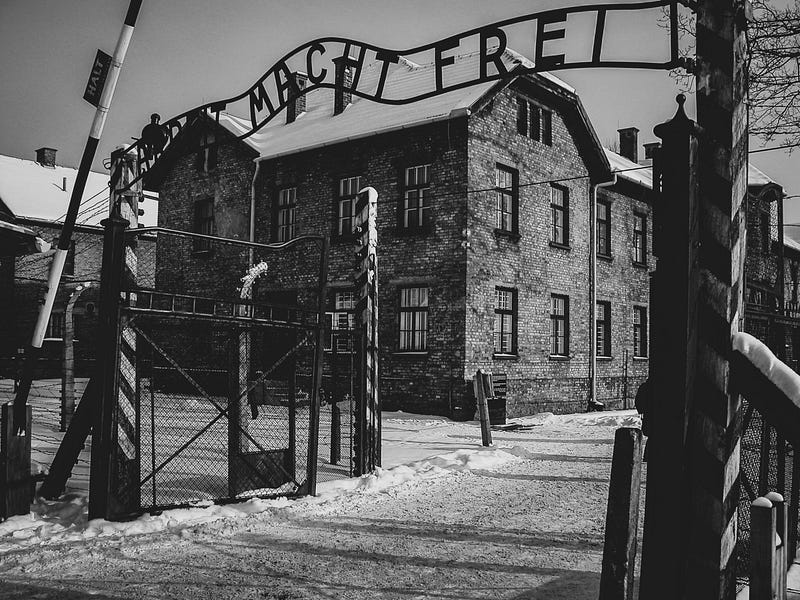“Those who cannot remember the past are condemned to repeat it.” — George Santayana

Last week I visited Auschwitz, the largest of the German Nazi concentration camps and extermination centers.
Looking at the piles of hair, I felt anger, sadness, and shame. I think about most parts of my countries recent history in disgust. I lack the words to talk about the Nazi time.
As a German, ignoring the past hundred years seems easier than facing them. Yet, I feel a responsibility to call these atrocities to our minds. So, here are three books to not forget our past.
1) Man’s Search for Meaning by Viktor Frankl
At the age of 39, Viktor Frankl was sent to a concentration camp. During imprisonment, he lost his brother, mother, and wife.
His memoir depicts the daily camp life and how the cruelties affected the mental state of its inmates who endure dehumanizing conditions. With the odds of 1 in 20, Frankl survives Auschwitz.
The book is hard to bear as it contains descriptions with graphic detail. When reading, you witness what concentration camp inmates have gone through.
“Human kindness can be found in all groups (camp guard or prisoner), even those which as a whole wit would be easy to condemn. “ — Viktor Frankl
2) The Boy in the Striped Pyjamas by John Boyne
This book is about Bruno, a young son of a Nazi officer, who lives in a house near Auschwitz. On his daily strolls, he meets another young boy behind a fence who turns out to be a Jew, imprisoned in the concentration camp.
One day, the Jewish boy asks his German friend for help to find his father. Bruno puts on a “Striped Pyjama” to disguise himself as one of the prisoners and enters the campground. Both boys will die in the gas chambers.
When I read this book as a teenager, I cried for hours. It made me care about history more than any high school lesson. Yet, there are flaws and plot holes about this story that you might want to consider before you decide whether to read it.
A 9-year-old boy would not survive over a year in a Nazi camp. After arriving on a cattle train to Auschwitz-Birkenau, officers sent children to the gas chamber.
This Holocaust survivor wrote about the book: “I was once myself a boy in striped pajamas and am a survivor of six German concentration camps. This book is so ignorant of historical facts about concentration camps that it kicks the history of the Holocaust right in the teeth.”
“What exactly was the difference? He wondered to himself. And who decided which people wore the striped pajamas and which people wore the uniforms?”
— John Boyne
3) The Choice by Dr. Edith Eger
At age 16, the Nazis came to Edith Eger’s Hungarian hometown. They deported the Jewish family to an internment center, then to Auschwitz. Upon arrival, Joseph Mengele sent her parents to the gas chamber.
Edith Eger and her sister Magda survived multiple death camps. In 1945, American Troops found them barely alive in a pile of corpses on the camp’s liberation.
The book consists of four sections: prison, escape, freedom and healing. It’s a mixture of the holocaust, a personal memoir, and psychology.
She works through her terrible experience in Auschwitz and takes us through a journey of her healing. By drawing on her patients’ personal cases, she derives wise and powerful life lessons.
Unlike the previous two stories, Dr. Edith Eger’s historical description is uplifting. While Frankl’s ‘Man’s Search for Meaning’ carries profundity and a deep understanding of human psychology, Dr. Edith Eger, who has been 20 years younger than Frankl and one of his students, adds warmth and life experience.
‘The Choice’ is one of the most inspiring books I have ever read.
“We don’t know where we’re going, we don’t know what’s going to happen, but no one can take away from you what you put in your own mind.” — Dr. Edith Eger
Want to improve your learning?
Subscribe free to The Learn Letter. I read a book and 50 articles a week, and each Wednesday, you’ll receive the best in your inbox. This newsletter will make you find tools and resources that help you on your path to health, wealth, and wisdom.